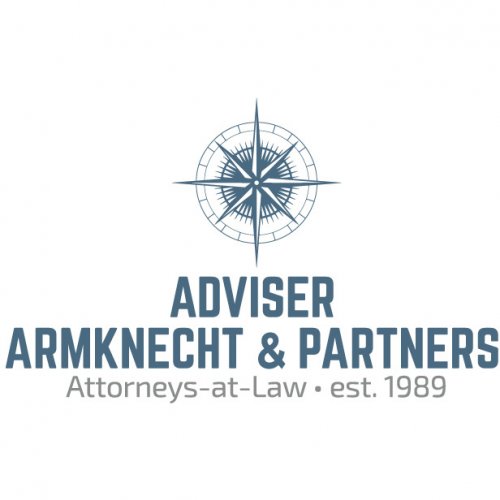Best Tax Increment Financing Lawyers in Gdynia
Share your needs with us, get contacted by law firms.
Free. Takes 2 min.
List of the best lawyers in Gdynia, Poland
About Tax Increment Financing Law in Gdynia, Poland
Tax Increment Financing (TIF) is an innovative financial mechanism used in urban development and regeneration projects. In Gdynia, Poland, TIF is utilized to stimulate economic growth by generating revenue for improvements in designated areas without raising existing taxes. By capturing the future increase in property taxes that arise from the development, municipalities can fund infrastructure and community projects. Gdynia's strategic implementation of TIF has been key to modernizing its urban landscape and promoting sustainable development.
Why You May Need a Lawyer
Engaging a lawyer experienced in Tax Increment Financing can be crucial for navigating complex projects and negotiations. Here are common situations where legal assistance might be necessary:
- Understanding the intricacies of TIF agreements and documentation to ensure compliance with local and national laws.
- Negotiating terms between developers, financial institutions, and government bodies to ensure favorable outcomes.
- Assisting with project proposals and securing necessary approvals from municipal authorities.
- Providing litigation support in case of disputes related to TIF projects, which may involve various stakeholders.
- Advising on tax implications and financial risks associated with TIF-funded projects.
Local Laws Overview
The legal framework governing Tax Increment Financing in Gdynia is influenced by broader Polish legislation concerning urban planning and public finance. Key aspects include:
- Designation of TIF Districts: Areas must be designated as TIF districts by local authorities, often involving a transparent public consultation process.
- Approval Process: TIF proposals require approval by the City Council of Gdynia, aligning with local development plans.
- Financial Management: TIF revenues are allocated in accordance with strict financial guidelines to ensure they serve intended development purposes.
- Regulatory Compliance: Projects must adhere to environmental regulations and urban sustainability goals set by the local government.
- Transparency and Accountability: Regular audits and reports are necessary to maintain public trust and comply with governmental standards.
Frequently Asked Questions
1. What is Tax Increment Financing?
TIF is a public financing method that uses future tax revenues generated by increasing property values in a designated area to finance current improvements and development.
2. How does TIF differ from other funding mechanisms?
TIF specifically relies on future tax earnings generated by increased property value, unlike other mechanisms that might rely on current taxes or state funds.
3. Who benefits from TIF projects?
Communities benefit through improved infrastructure and urban development, while developers and businesses gain from increased property values and economic activity.
4. Are there risks involved in TIF?
Yes, risks include potential underperformance of anticipated tax revenue increases, which might impact project funding and community benefits.
5. Can residential projects be funded by TIF?
Yes, TIF can be used to fund residential projects if they align with broader development plans and objectives of the TIF district.
6. How are TIF areas determined?
TIF areas, or districts, are determined by local authorities based on criteria such as the need for development and potential for economic stimulation.
7. Is public consultation part of the TIF process?
Yes, public consultation is typically required when designating TIF districts and approving associated development projects.
8. What role do local governments play in TIF?
Local governments initiate, manage, and oversee TIF projects, ensuring they align with urban development goals and regulations.
9. Can TIF projects face legal challenges?
Yes, they can face challenges related to transparency, environmental impact, or disputes among stakeholders.
10. How to ensure compliance with TIF regulations?
Engage with legal experts familiar with TIF laws and local regulations to navigate compliance successfully.
Additional Resources
For those seeking further information and assistance, consider reaching out to the following:
- Gdynia City Council's Development and Financing Department for detailed guidelines on TIF.
- Local legal firms specializing in urban development and public finance law.
- National and regional economic development organizations in Poland for resources and assistance.
- Chambers of commerce in the Gdynia area for networking with experienced professionals in TIF projects.
Next Steps
If you require legal assistance with TIF in Gdynia, Poland, consider the following steps:
- Research and connect with lawyers or firms specializing in tax increment financing and urban development.
- Prepare a summary of your project or interest area concerning TIF to facilitate clearer communication with legal advisors.
- Schedule consultations to discuss potential legal challenges and compliance requirements with experienced attorneys.
- Engage with local governmental bodies to understand the detailed procedural requirements for TIF projects in Gdynia.
Lawzana helps you find the best lawyers and law firms in Gdynia through a curated and pre-screened list of qualified legal professionals. Our platform offers rankings and detailed profiles of attorneys and law firms, allowing you to compare based on practice areas, including Tax Increment Financing, experience, and client feedback.
Each profile includes a description of the firm's areas of practice, client reviews, team members and partners, year of establishment, spoken languages, office locations, contact information, social media presence, and any published articles or resources. Most firms on our platform speak English and are experienced in both local and international legal matters.
Get a quote from top-rated law firms in Gdynia, Poland — quickly, securely, and without unnecessary hassle.
Disclaimer:
The information provided on this page is for general informational purposes only and does not constitute legal advice. While we strive to ensure the accuracy and relevance of the content, legal information may change over time, and interpretations of the law can vary. You should always consult with a qualified legal professional for advice specific to your situation.
We disclaim all liability for actions taken or not taken based on the content of this page. If you believe any information is incorrect or outdated, please contact us, and we will review and update it where appropriate.








